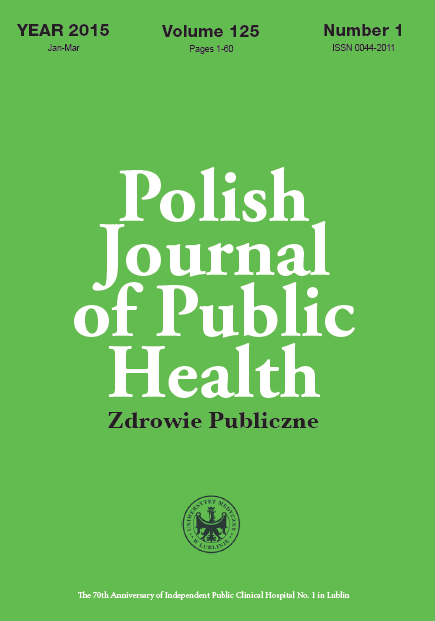Advances in hematology – research that revolutionized patient care
DOI:
https://doi.org/10.1515/pjph-2015-0019Keywords:
hronic lymphocytic leukemia, immunochemotherapy, monoclonal antibodies, multiple myeloma, proteasome inhibitors, immunomodulatory drugs, chronic myeloid leukemia, tyrosine kinase inhibitors, bone marrow transplantationAbstract
In the last decades, substantial strides have been made in the diagnosis, treatment, and prevention of blood diseases. The new drugs to be used in combination with cytostatic therapy have been developed, based on increased understanding of the biology of neoplasia. The diagnosis of several diseases is based exclusively on cytogenetic and molecular analysis which has become a part of routine diagnostic management. Moreover, molecular definition has allowed the introduction of therapy targeted at molecular change characteristic for a given disease. The introduction of novel agents for the treatment of hematological disorders has resulted in a great improvement in response rate and median survival.
The aim of this study is to show advances and possible future directions in the treatment of chosen hematological malignancies during the recent decades.
References
1. Hallek M, Fischer K, Fingerle-Rowson G, et al. Addition of rituximab to fludarabine and cyclophosphamide in patients with chronic lymphocytic leukaemia: a randomized, open-label, phase 3 trial. Lancet. 2010;376:1164-74.[Web of Science]
2. Goede V, Fischer K, Busch R, et al. Obinutuzumab plus chlorambucil in patients with CLL and coexisting conditions. N Engl J Med. 2014;370:1101-10. [Web of Science]
3. Martyr S, Aue G, Saba N, et al. Ibrutinib for previously untreated and relapsed or refractory chronic lymphocytic leukaemia with TP53 aberrations: a phase 2, single-arm trial. Lancet Oncol. 2015;16:169-76. [Web of Science]
4. Burke RT, Meadows S, Loriaux MM, et al. A potential therapeutic strategy for chronic lymphocytic leukemia by combining Idelalisib and GS-9973, a novel spleen tyrosine kinase (Syk) inhibitor. Oncotarget. 2014;28:908-15.
5. Souers AJ, Leverson JD, Boghaert ER, et al. ABT-199, a potent and selective BCL-2 inhibitor, achieves antitumor activity while sparing platelets. Nat Med. 2013;19:202-8. [Web of Science]
6. Jabbour AJ, Kanterjian H. Chronic myeloid leukemia: 2014 update on diagnosis, monitoring, and management. Am J Hematol. 2014;89:548-56.
7. Hughes T, White D. Which TKI? An embarrassment of riches for chronic myeloid leukemia patients. Hematology Am Soc Hematol Educ Program. 2013;2013:168-75.
8. Baccarani M, Deininger MW, Rosti G, et al. European Leukemia Net recommendations for the management of chronic myeloid leukemia. Blood. 2013;122:872-84.
9. Sweet K, Oehler V. Discontinuation of tyrosine kinase inhibitors in chronic myeloid leukemia: when is this a safe option to consider? Hematology Am Soc Hematol Educ Program. 2013;2013:184-8.
10. Spicka I. Advances in multiple myeloma therapy during two past decades. CSBJ. 2014;10:38-40. [CrossRef]
11. Röllig C, Knop S, Bornhäuser M. Multiple myeloma. Lancet.doi: 10.1016/S0140-6736(14)60493-1 [Epub ahead of print]. [PubMed] [CrossRef]
12. Scheid C, Sonneveld P, Schmidt-Wolf IG, et al. Bortezomib before and after autologous stem cell transplantation overcomes the negative prognostic impact of renal impairment in newly diagnosed multiple myeloma: a subgroup analysis from the HOVON-65/GMMG-HD4 trial. Hematol. 2014;99:148-54.
13. San Miguel JF, Schlag R, Khuageva NK, et al. VISTA trial investigators: bortezomib plus melphalan and prednisone for initial treatment of multiple myeloma. N Engl J Med. 2008;359:906-17. [Web of Science]
14. Harousseau JL, Palumbo A, Richardson P, et al. Superior outcomes associated with complete response in newly diagnosed multiple myeloma patients treated with non-intensive therapy: analysis of the phase 3 VISTA study of bortezomib plus melphalan-prednisone versus melphalan- prednisone. Blood. 2010;116(19):3743-50.
15. Hopman RK, DiPersio JF. Advances in stem cell mobilization. Blood Rev. 2014;28:31-40.
16. Arnaout K, Patel N, Jain M, et al. Complications of allogeneic hematopoietic stem cell transplantation. Cancer Invest. 2014;32:349-62. [Web of Science] [CrossRef] [PubMed]
Downloads
Published
Issue
Section
License
Copyright (c) 2015 Polish Journal of Public Health

This work is licensed under a Creative Commons Attribution-NonCommercial-NoDerivatives 3.0 Unported License.


